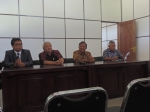ITB Discusses the Energy Climate Governance Model in Indonesia Post-COP28 UNFCCC

BANDUNG, itb.ac.id - The Center for Climate Change at Institut Teknologi Bandung (PPI ITB) organized a symposium titled “Post-COP28 UNFCCC: Reflection on Climate Governance in Equitable Energy Transition in Indonesia,” at the Conference Hall, CRCS Building, ITB Ganesha Campus. The symposium took place on Thursday (12/14/2023) and was also conducted online via Zoom.
One of the speakers from SNAPFI-PPI ITB team, Dr. Niken Prilandita, S.T., M.Sc., presented the study conducted by PPI ITB regarding domestic issues. The research team was divided into two groups: the “National Study”, which focused on domestic issues, and the “Cross-Country/International Study”, which focused on international communication.

She explained that the research had been ongoing for four years and covered aspects such as policy, the private sector’s contribution to financing, and progress in renewable energy development.
In formulating a model for climate and energy governance in Indonesia, PPI ITB’s research team utilized a four-dimensional framework. This framework involved key actors or institutions, policies, policy formulation, and financing conditions.
In the context of policies, she stated, “When we started this research in 2019 or 2020, policies related to the energy and climate sectors in Indonesia were constantly changing, and we had to continually update our findings.”
Based on the results, institutions such as the Ministry of National Development Planning (Bappenas), the Ministry of Environment and Forestry (KLHK), the Ministry of Energy and Mineral Resources (ESDM), and the National Energy Council (DEN) played significant roles. Both ESDM and DEN were considered the most influential parties in climate energy governance in Indonesia.
Key policies that were identified involve the development of national policies such as the Nationally Determined Contribution (NDC), Net Zero Emission (NZE), National Energy General Plan (RUEN), and National Electricity General Plan (RUKN).
In conclusion, she mentioned that the role of DEN could be enhanced further, as there are still policies that prioritized fossil fuels. These findings are expected to serve as the groundwork for the sustainable energy transition in Indonesia.
Reporter: Hafsah Restu Nurul Annafi (Urban and Regional Planning ‘19)
Translator: Ariq Ramadhan Teruna (Chemical Engineering ‘21)
Editor: Sherina Wijaya (Geological Engineering, ‘19)

scan for download







